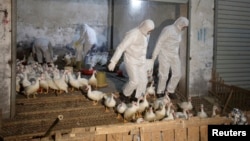LONDON —
Six more people in China have been confirmed as infected with the new H7N9 strain of bird flu and one of them has died, the World Health Organization [WHO] said on Monday.
Three of the other five patients are hospitalized in either serious or critical condition, while the remaining two have mild symptoms, the United Nations health agency said in a disease outbreak update.
H7N9 bird flu emerged last year in China and has infected about 150 people there so far, and in Taiwan and Hong Kong, killing at least 46 of them.
The latest death was a 38-year-old man from China's Fujian Province who became ill with H7N9 on Jan. 3, was admitted to hospital on Jan. 8 but died 2 days later. He had underlying illnesses, including tuberculosis and pneumoconiosis.
China's state news agency Xinhua reported another death from H7N9 in the southwestern Guizhou province on Monday, but this has yet to be confirmed by the WHO.
A 65-year-old man infected with H7N9 also died in Hong Kong, the government said on Monday. This death has also yet to be confirmed by the WHO.
The WHO reiterated there is no evidence as yet of any easy or sustained person-to-person transmission of the strain, and that the source of the human infections is still under investigation.
Researchers in the United States said last month that while it is not impossible that H7N9 could become easily transmissible between people, it would need to undergo multiple mutations to do that. Scientists around the world are keeping a watchful eye, on alert for any sign the virus might develop that potential and start to spread rapidly.
Three of the other five patients are hospitalized in either serious or critical condition, while the remaining two have mild symptoms, the United Nations health agency said in a disease outbreak update.
H7N9 bird flu emerged last year in China and has infected about 150 people there so far, and in Taiwan and Hong Kong, killing at least 46 of them.
The latest death was a 38-year-old man from China's Fujian Province who became ill with H7N9 on Jan. 3, was admitted to hospital on Jan. 8 but died 2 days later. He had underlying illnesses, including tuberculosis and pneumoconiosis.
China's state news agency Xinhua reported another death from H7N9 in the southwestern Guizhou province on Monday, but this has yet to be confirmed by the WHO.
A 65-year-old man infected with H7N9 also died in Hong Kong, the government said on Monday. This death has also yet to be confirmed by the WHO.
The WHO reiterated there is no evidence as yet of any easy or sustained person-to-person transmission of the strain, and that the source of the human infections is still under investigation.
Researchers in the United States said last month that while it is not impossible that H7N9 could become easily transmissible between people, it would need to undergo multiple mutations to do that. Scientists around the world are keeping a watchful eye, on alert for any sign the virus might develop that potential and start to spread rapidly.





